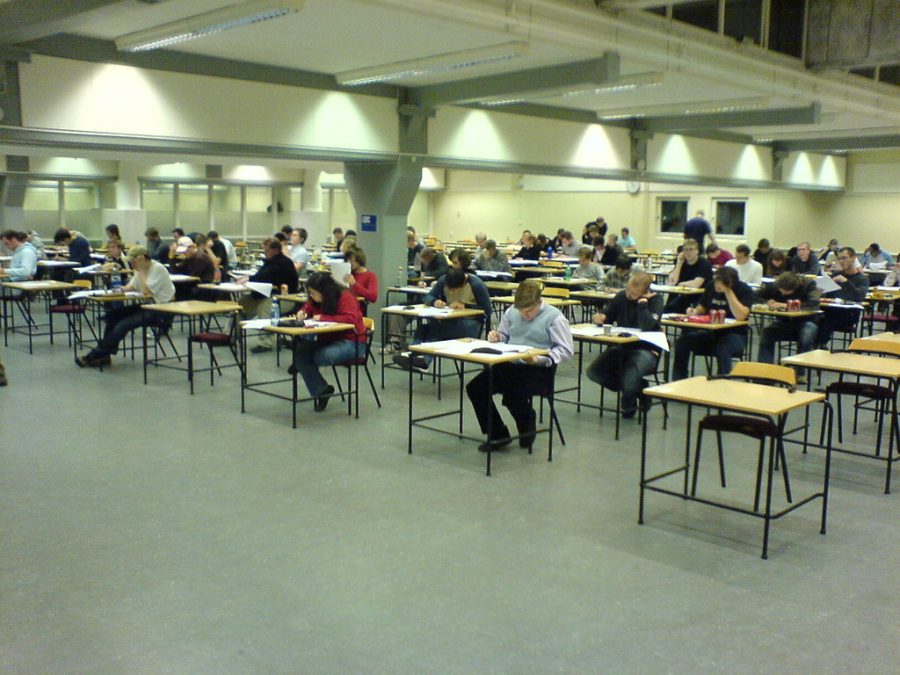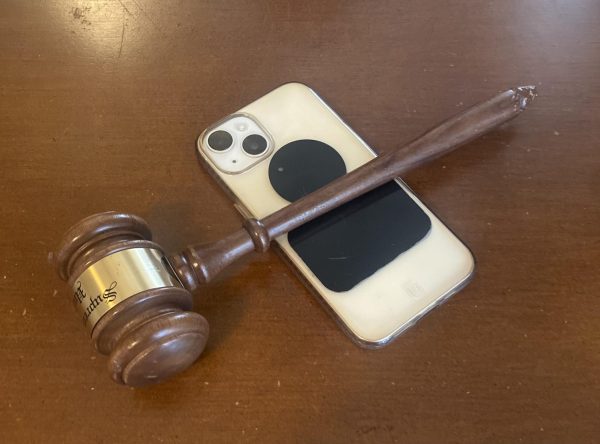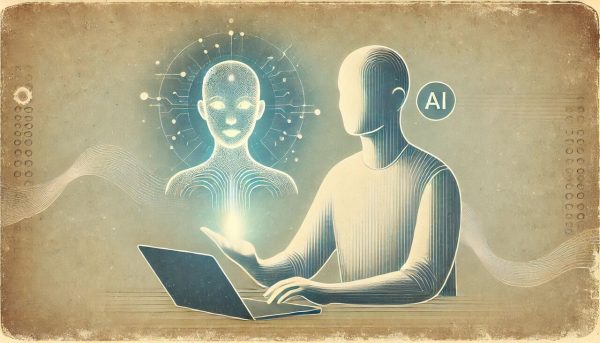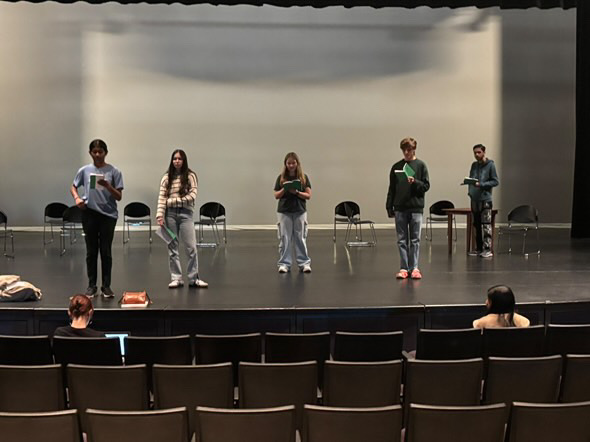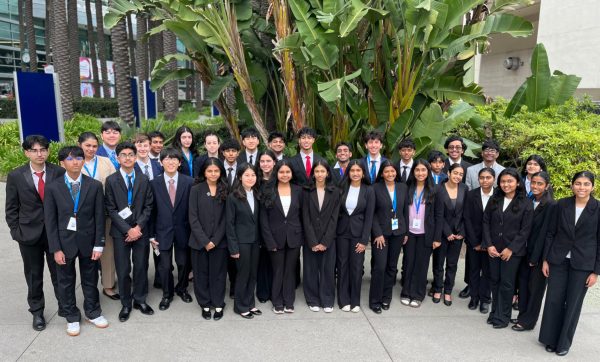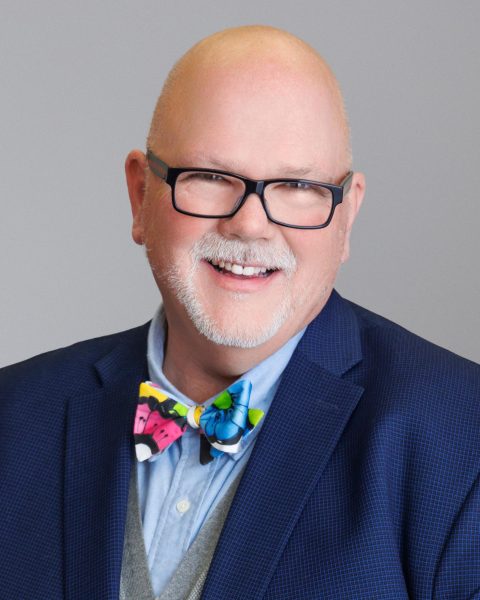AP Testing: Plans and Predictions
In previous years all AP Tests were full-length (3 hours) and administered in-person.
Late nights flipping through review books with sweaty hands are going to become the new normal for students studying for their AP test this year. Thus far, Wilcox has spent over $130,000 on over 1,500 AP tests for its students. With over 645 students taking AP classes this year at Wilcox, it is important to understand the current plan and teacher’s predictions for what the AP Tests will look like.
Currently The College Board, which runs the AP testing program, claims they plan on holding full tests. In a normal year, tests span up to three hours long and cover several different testing formats including multiple choice, short answer, and essays. This year, The College Board hopes to hold in-person testing for a majority of students across the nation, but have recently stated they will have full online tests for students who cannot make it to an in-person testing site.
Many students, parents, and teachers are concerned with what the AP tests will look like this year because The College Board continues to update and change their plans. Teachers across several different departments commented on how College Board seems to be “holding their breath,” as Mr. Hedlund put it, or how, according to Ms. Nuti, it “doesn’t sound like there’s a solid plan.”
Last year, AP tests were shortened, with most being just two questions with several parts. As Mr. Contreras put it when asked about The College Board’s handling of last year’s tests, teachers had a “mixed bag of emotions.” The tones varied from some who were more cautious and others who were thoroughly disappointed. AP Physics teacher Mr. Dobos commented, “I’m not putting an emphasis on what the AP board wants this year, I’m putting an emphasis on what my students should know if they took an AP class… [The College Board] have lost their credibility with me.”
The College Board however, still holds their credibility with hundreds of colleges across the country, so students should still be prepared to take their AP tests come what may. The following is what every department had to say about AP testing plans this year.
English:
The following teachers from the English Department shared their input: Ms. Courey, Mr. Jackson, Ms. Nuti, and Ms. Guttadauro. With recent changes in the AP Literature and AP English Language rubrics, teachers are unsure how well prepared their students are for the exam. Ms. Nuti described the conditions as the “perfect storm for uncertainty.” Mr Jackson and the rest of the department worried over the impact of less teaching time due to distance learning on AP students.
Everyone on the call agreed on one thing students could and should do to prepare for their AP English tests: “Do the reading!” All teachers emphasized the benefits of reading, more specifically reading with integrity (not with Sparknotes or Litcharts). Mr. Jackson stated, “compare reading complex tests to working out…if you went to the gym and watched other people work out, you’re not going to get any stronger.” All the teachers reasoned that it was appropriate to use sources like Sparknotes only after students have completed the reading on their own. “There are no shortcuts,” stated Ms. Courey.
Math:
Mr. Hedlund and Mr. Contreras agreed that distance learning versions of their classes were not putting their “best foot forward,” as Mr. Contreras put it. Mr Hedlund addressed some good news for his AP Calculus students: the AP board tends to normalize the scoring. This means there are about the same number of threes, fours, and fives each year, and Wilcox students will be prepared to get those scores. Mr. Contreras is confident that “we’ll be prepared” for the AP math tests come May.
What is the best thing students could do to prepare for their AP math tests? “Practice, practice, practice” said Mr. Hedlund. Both AP Calculus classes and the AP Statistics class have review time integrated into the curriculum. Mr. Contreras stated that this time is “very essential” and that students should “always ask questions” if they are having trouble with a concept.
Science:
Mr. Iverson stated that his chemistry students were on track to getting through all the material. He based that off of the “ludicrously fast” catch up guide he received from The College Board for teachers who were behind in the subject. Mr. Dobos felt confident that his AP Physics 2 students were on track to learn all the key concepts, but recognized that his AP Physics 1 students were not doing as well as they normally do in-person.
The science classes may suffer from the loss of in-person labs this year, but there are still ways students can prepare for their AP exams at home. Mr. Iverson stated, “I think the study guides with problem sets are pretty useful for students. That’s the kind of thing you could do on your own.” If students have questions after completing part of the study guide, they can always ask their teacher about it, or check the answer key if one is provided. Mr. Iverson did later caution, “It may not be so good for learning chemistry or physics, but it’s definitely good for scoring well on the test.” Mr. Dobos agreed with the comment and went further to address his classes commenting “[the students] don’t really understand what’s happening” when watching a Khan Academy video and that students should not “rush to look at the answer.” Many students look to the internet for help with their homework and find videos detailing how to do it. Instead of watching the whole video, Mr. Dobos hopes students will pause once they are no longer stuck on a particular problem. By doing so he hopes students can, “do more of the work, as opposed to watching someone else doing the work.”
Social Science:
Mr. Soykin acknowledges the fact that, “There are fewer instructional hours, fewer opportunities for rigorous practice tests, and much more uncertainty than during a ‘normal’ school year,” but he stated that, “I am doing everything that I can to prepare my students for the AP exam this year.” Ms. Scott felt confident that there would be “equal opportunities for each student at Wilcox.”
Advice both teachers gave for their students was to practice. “Regardless of where students are learning from, preparing for an AP social science test is the same: practice, practice, practice,” said Mr. Soykin. He emphasised writing practice with “the various types of essays that are required on the AP exam,” including DBQs and SAQs. Ms. Scott recommended that students use The College Board’s AP website to practice.
World Language:
Right away in my conversation with Ms. Nishio, Ms. Tamaki, Ms. Hassan, and Ms. Alfonso, it became clear that distance learning was a struggle for the world language teachers. “Online learning has changed the way we communicate,” commented Ms. Hassan when explaining that a big part of communication is non- verbal. World language teachers can no longer look at students as they speak, so it becomes much more difficult for them to see how well the student understands what they are saying, and what is being said. All teachers agreed that they were giving “priority to what is essential” in their class. Ms. Tamaki commented, “I want to help students be ready for the AP exam within a limited amount of time.”
Even though AP World Language students may face an uphill battle this year, the world language teachers had several tips for their student’s studies. “We encourage the students to be surrounded by the language and culture as much as possible,” stated Ms. Hassan. She also cautioned that some native speakers may already be able to speak a language but should still expose themselves to “sophisticated” or more “academic” uses of the language. Ms. Tamaki recommended that students, “try their best to learn on their own” and “try something they’re more interested in.” In the same vein, Ms. Alfonso brought up the idea of watching movies with captions on.
Wilcox has the potential to host in-person testing. When asked about the logistics of this at Wilcox, Vice Principal George Niczewicz responded, “Wilcox has PPE (personal protective equipment) and other necessary equipment to offer the exam within the health guidelines from the County. Wilcox does not have enough proctors available with the staff currently on our campus.” He continued, “The College Board has contingency plans for at-home examinations for schools that are unable to offer an in-person examination,” to reassure that all students at WIlcox will be supported to take the test whether in-person or online.
Updates about the AP testing plan can be found on the school website’s “College Board Testing Information Center” under the “Academics” tab for anyone looking to learn more.

